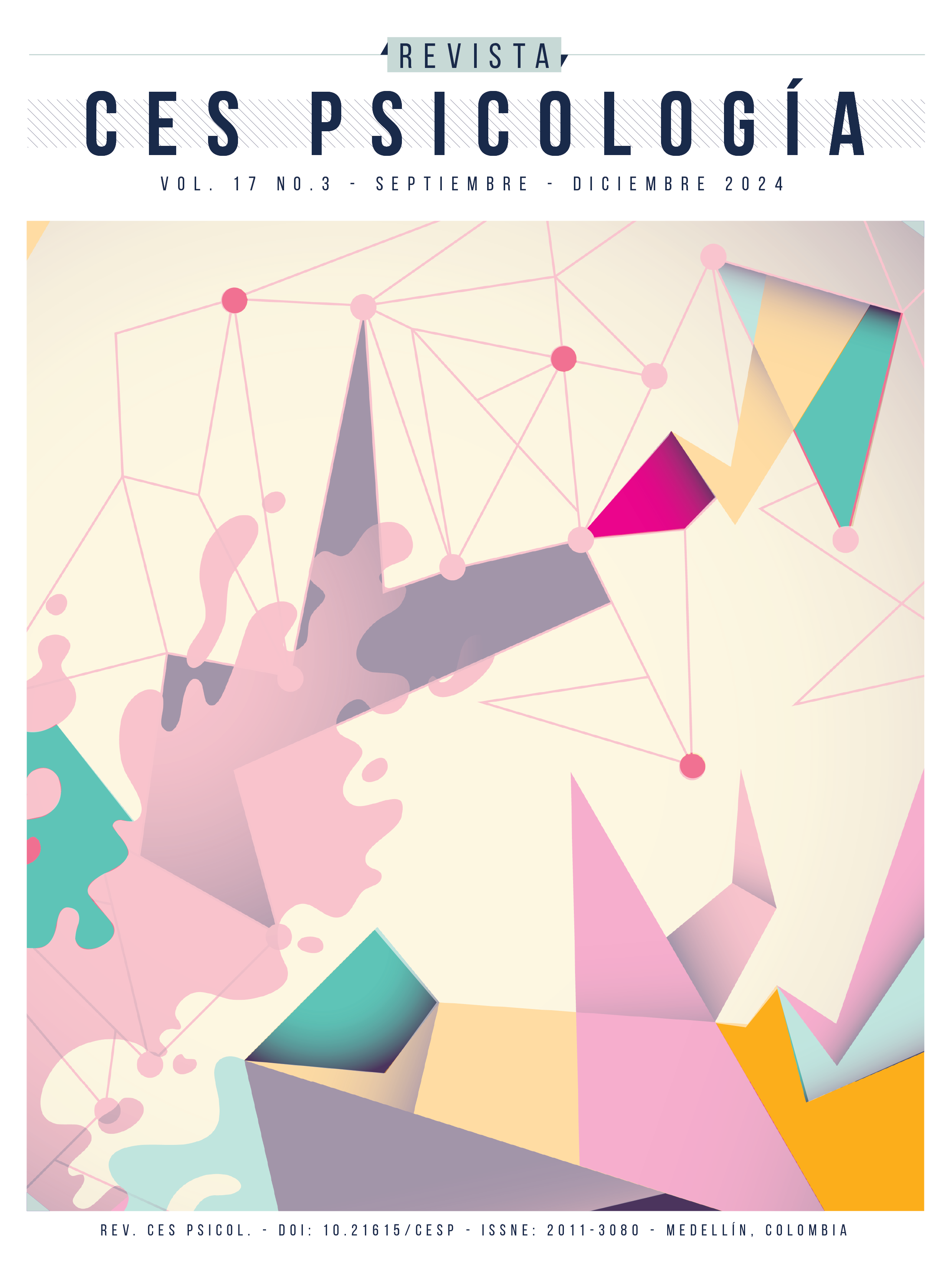Videojuegos en psicoterapia: una revisión cuasi-sistemática de la literatura
DOI:
https://doi.org/10.21615/cesp.7084Palabras clave:
juegos electrónicos, juegos serios, psicoterapia, Psicología ClínicaResumen
Los videojuegos, además de su función de entretenimiento, pueden convertirse en complementos relevantes de la psicoterapia tradicional. Este estudio consiste en una revisión cuasi sistemática de la literatura que tuvo como objetivo examinar estudios empíricos que utilizaron los videojuegos como recursos terapéuticos, así como describir su papel en el proceso psicoterapéutico en cuanto a la aceptación de los videojuegos en la terapia, aceptación de la psicoterapia y mejora de la relación terapéutica. Para la búsqueda de estudios se utilizaron cinco bases de datos electrónicas (PsycInfo, Pubmed, Scielo, Web of Science y Scopus). Los criterios de inclusión se definieron según la metodología PICOS (Population, Interventions, Controls, Outcome, and Study design). La revisión incluyó artículos publicados en inglés, francés, español y alemán entre enero de 2007 y julio de 2022. Inicialmente se identificaron 202 artículos y se seleccionaron 16 para la revisión, con base en los criterios de inclusión y exclusión, siete de los cuales fueron experimentales y nueve con metodología cualitativa. Seis de siete estudios experimentales y cuasiexperimentales informaron mejora en la conducta objetivo de la psicoterapia. En estudios con metodología cualitativa se reportaron resultados positivos en cuanto a la aceptación de los videojuegos en terapia, la aceptación y motivación para la psicoterapia y/o la mejora de la relación terapéutica. Los resultados permiten concluir que los videojuegos utilizados como recursos para intervenciones en el contexto psicoterapéutico favorecen el proceso terapéutico.
Descargas
Referencias bibliográficas
Al Keilani, M. Al H., & Delvenne, V. (2020). Use of video games in a child and adolescent psychiatric unit. Psychiatria Danubina, 32(Suppl 1), 167–171. https://www.psychiatria-danubina.com/UserDocsImages/pdf/dnb_vol32_noSuppl%201/dnb_vol32_noSuppl%201_167.pdf
Brezinka, V. (2011). Schatzsuche" - ein verhaltenstherapeutisches Computerspiel. ["Treasure hunt" - A cognitive-behavioural computer game.]. Praxis der Kinderpsychologie und Kinderpsychiatrie, 60(9), 762–776. https://doi.org/10.13109/prkk.2011.60.9.762
Brezinka, V. (2016). Computerspiele in der psychotherapie - Neue entwicklungen. [New developments in video games for psychotherapy.]. Praxis der Kinderpsychologie und Kinderpsychiatrie, 65(2), 82-96. https://doi.org/10.13109/prkk.2016.65.2.82
Bolsoni-Silva, A. T., & Del Prette, A. (2003). Problemas de comportamento: Um panorama da área. Revista Brasileira de Terapia Comportamental e Cognitiva, 5(2), 91–103. https://doi.org/10.31505/rbtcc.v5i2.74
Booth, A. (2016). Searching for qualitative research for inclusion in systematic reviews: A structured methodological review. Systematic Reviews, 5, 74. https://doi.org/10.1186/s13643-016-0249-x
Carrasco, Á. E. (2016). Acceptability of an adventure video game in the treatment of female adolescents with symptoms of depression. Research in Psychotherapy: Psychopathology, Process and Outcome, 19(1), 10–18. https://doi.org/10.4081/ripppo.2016.182
Cooke, A., Smith, D., & Booth, A. (2012). Beyond PICO: The SPIDER tool for qualitative evidence synthesis. Qualitative Health Research, 22(10), 1435-1443. https://doi.org/10.1177/1049732312452938
Coyle, D., Doherty, G., & Sharry, J. (2009). An evaluation of a solution focused computer game in adolescent interventions. Clinical Child Psychology and Psychiatry, 14(3), 345–360. https://doi.org/10.1177/1359104508100884
David, O. A., Cardoș, R. A. I., & Matu, S. (2019). Is REThink therapeutic game effective in preventing emotional disorders in children and adolescents? Outcomes of a randomized clinical trial. European Child and Adolescent Psychiatry, 28(1), 111–122. https://doi.org/10.1007/s00787-018-1192-2
Donard, V., & Simar, E. (2012). La médiation vidéo-ludique en psychothérapie. Enfances et Psy, 55(2), 79–88. https://doi.org/10.3917/ep.055.0079
Eichenberg, C., Grabmayer, G., & Green, N. (2016). Acceptance of serious games in psychotherapy: An inquiry into the stance of therapists and patients. Telemedicine and E-Health, 22(11), 945–951. https://doi.org/10.1089/tmj.2016.0001
Endendijk, J. J., Tichelaar, H. K., Deen, M., & Deković, M. (2021). Vil Du?! incorporation of a serious game in therapy for sexually abused children and adolescents. Child and Adolescent Psychiatry and Mental Health, 15(1). https://doi.org/10.1186/s13034-021-00377-3
Harden, A. (2010). Mixed-Methods systematic reviews: Integrating quantitative and qualitative findings. FOCUS: Technical Brief, 25, 1-8. https://ktdrr.org/ktlibrary/articles_pubs/ncddrwork/focus/focus25/Focus25.pdf
Haza, M., & Houssier, F. (2018). Videogame images and psychotherapy among adolescents: Violence or catharsis? Evolution Psychiatrique, 83(3), 467–476. https://doi.org/10.1016/j.evopsy.2018.04.001
Hinton, R. (2015). Assessing the strength of evidence in the education sector, report prepared for building evidence in education (BE2). DFID. https://www.edu-links.org/sites/default/files/media/file/BE2_Guidance_Note_ASE_0.pdf
Khan, S., Kazmi, F., & Maroof, R. Y. (2019). Therapeutic outcomes of 3D-GIT game among depressive cancer patients. FWU Journal of Social Sciences, 13(3), 57–64. http://sbbwu.edu.pk/journal/pages/FWU_Journal_Winter2019_Vol.13_No.3.php
Kovacs, M. (2001). CDI Children’s Depression Inventory: Technical manual. Multi-Health Systems, Inc.
Kowal, M., Conroy, E., Ramsbottom, N., Smithies, T., Toth, A., & Campbell, M. (2021). Gaming your mental health: A narrative review on mitigating symptoms of depression and anxiety using commercial video games. JMIR Serious Games, 9(2), 1–13. https://doi.org/10.2196/26575
Llorens, R., Noé, E., Ferri, J., & Alcañiz, M. (2015). Videogame-based group therapy to improve self-awareness and social skills after traumatic brain injury. Journal of NeuroEngineering and Rehabilitation, 12(37). https://doi.org/10.1186/s12984-015-0029-1
Mahon-Daly, S., & Jeyasingam, N. (2021). A narrative literature review: The application of video games as therapeutic tools for psychological therapy. Australasian Psychiatry, 29(6), 614–616. https://doi.org/10.1177/10398562211022751
Marçal, J. V. de S. (2005). Estabelecendo objetivos na prática clínica: Quais caminhos seguir? Revista Brasileira de Terapia Comportamental e Cognitiva, 7(2), 231-246. https://doi.org/10.31505/rbtcc.v7i2.32
Medeiros, C. A. de (2002). Comportamento verbal na terapia analítico comportamental. Revista Brasileira de Terapia Comportamental e Cognitiva, 4(2), 105-118. http://pepsic.bvsalud.org/scielo.php?script=sci_arttext&pid=S1517-55452002000200004&lng=pt&tlng=pt
Methley, A. M., Campbell, S., Chew-Graham, C., McNally, R., & Cheraghi-Sohi, S. (2014). PICO, PICOS and SPIDER: A comparison study of specificity and sensitivity in three search tools for qualitative systematic reviews. BMC Health Services Research, 14(579). https://doi.org/10.1186/s12913-014-0579-0
Miranda, F. S., & Stadzisz, P. C. (2017, 02 novembro). Jogo Digital: definição do termo [Simpósio]. XVI Simpósio Brasileiro de Jogos e Entretenimento Digital, Curitiba, PR, Brasil. https://www.sbgames.org/sbgames2017/papers/ArtesDesignShort/173500.pdf
Panosso, M. G., Souza, S. R., & Haydu, V. B. (2015). Características atribuídas a jogos educativos: Uma interpretação analítico-comportamental. Psicologia Escolar e Educacional, 19(2), 233-241. https://doi.org/10.1590/2175-3539/2015/0192821
Page, M. J., McKenzie, J. E., Bossuyt, P. M., Boutron, I., Hoffmann, T. C., Mulrow, C. D., Shamseer, L., Tetzlaff, J. M., Akl, E. A., Brennan, S. E., Chou, R., Glanville, J., Grimshaw, J. M., Hróbjartsson, A., Lalu, M. M., Li, T., Loder, E. W., Mayo-Wilson, E., McDonald, S., … Moher, D. (2021). The PRISMA 2020 statement: An updated guideline for reporting systematic reviews. The BMJ, 372 (71), 1-9. https://doi.org/10.1136/bmj.n71
Pine R., Fleming T., McCallum S., & Sutcliffe K. (2020), The effects of casual videogames on anxiety, depression, stress, and low mood: A systematic review. Games Health Journal, 9(4), 255–264. https://doi.org/10.1089/g4h.2019.0132
Poppelaars, M., Lichtwarck-Aschoff, A., Otten, R., & Granic, I. (2021). Can a commercial video game prevent depression? Null results and whole sample action mechanisms in a randomized controlled trial. Frontiers in Psychology, 11. https://doi.org/10.3389/fpsyg.2020.575962
Richardson, W. S., Wilson, M. C., Nishikawa, J., & Hayward, R. S. A. (1995). The well-built clinical question: a key to evidence-based decisions. ACP Journal Club, 123(3), A12. https://doi.org/10.7326/ACPJC-1995-123-3-A12
Richter, D., & Dixon J. (2022). Models of mental health problems: A quasi-systematic review of theoretical approaches. Journal of Mental Health, 11, 1-11. https://doi.org/10.1080/09638237.2021.2022638
Rodrigo-Yanguas, M., González-Tardón, C., Bella-Fernández, M., & Blasco-Fontecilla, H. (2022). Serious video games: Angels or demons in patients with attention-deficit hyperactivity disorder? A quasi-systematic review. Frontiers in psychiatry, 13, 798480. https://doi.org/10.3389/fpsyt.2022.798480
Sajjad, S., Abdullah, A. H., Sharif, M., & Mohsin, S. (2014). Psychotherapy through video game to target illness related problematic behaviors of children with brain tumor. Current Medical Imaging Reviews, 10(1), 62–72. https://doi.org/10.2174/1573405610666140313004302
Santamaria, J. J., Soto, A., Fernandez-Aranda, F., Krug, I., Forcano, L., Gunnard, K., Kalapanidas, E., Lam, T., Raguin, T., Davarakis, C., Menchon, J.M., Jimenez-Murcia S. (2011). Serious games as additional psychological support: A review of the literature. Journal of CyberTherapy and Rehabilitation, 4(4), 469-476. link.gale.com/apps/doc/A321336264/HRCA?u=anon~6c20323e&sid=googleScholar&xid=a04c1cb5 Accessed 6 Aug. 2024
Schuurmans, A. A. T., Nijhof, K. S., Engels, R. C. M. E., & Granic, I. (2018). Using a videogame intervention to reduce anxiety and externalizing problems among youths in residential care: An initial randomized controlled trial. Journal of Psychopathology and Behavioral Assessment, 40(2), 344–354. https://doi.org/10.1007/s10862-017-9638-2
Skinner, B. F. (1953). Science and human behavior. Macmillan.
Sturmey, P. (1996). Functional Analysis in Clinical Psychology. John Wiley & Sons, Inc.
Thomas, J., Harden, A., Oakley, A., Oliver, S., Sutcliffe, K., Rees, R., Brunton, G., Kavanagh, J. (2004). Integrating qualitative research with trials in systematic reviews. The BMJ, 24(328), 1010-1012. https://doi.org/10.1136/bmj.328.7446.1010
van Rijn, B., Chryssafidou, E., Falconer, C. J., & Stiles, W. B. (2019). Digital images as meaning bridges: Case study of assimilation using avatar software in counselling with a 14-year-old boy. Counselling and Psychotherapy Research, 19(3), 252–263. https://doi.org/10.1002/capr.12230
Yu, F., Mathiason, M. A., Johnson, K., Gaugler, J. E., & Klassen, D. (2019). Memory matters in dementia: Efficacy of a mobile reminiscing therapy app. Alzheimer’s and Dementia: Translational Research and Clinical Interventions, 5, 644–651. https://doi.org/10.1016/j.trci.2019.09.002
World Health Organization. (2022). ICD-11: International classification of diseases (11th revision). https://icd.who.int/browse11/l-m/en#/http://id.who.int/icd/entity/1448597234
Zayeni, D., Raynaud, J. P., & Revet, A. (2020). Therapeutic and preventive use of video games in child and adolescent psychiatry: A systematic review. Frontiers in Psychiatry, 11. https://doi.org/10.3389/fpsyt.2020.00036
Descargas
Publicado
Cómo citar
Número
Sección
Licencia
Derechos de autor 2024 Tatiane Carvalho Castro, Luciana Parisi Martins Yamaura, Verônica Bender Haydu

Esta obra está bajo una licencia internacional Creative Commons Atribución-NoComercial-CompartirIgual 4.0.
Revista CES Psicología ISSN 2011 3080
Facultad de Psicología, Universidad CES Primera edición 2008. Última actualización Mayo 29 de 2024. Todos los derechos reservados. Hecho el depósito legal que exige la ley.
Se autoriza la reproducción total o parcial de los artículos citando la fuente y el autor. This publication may be reproduced by mentioning the source and the authors.



